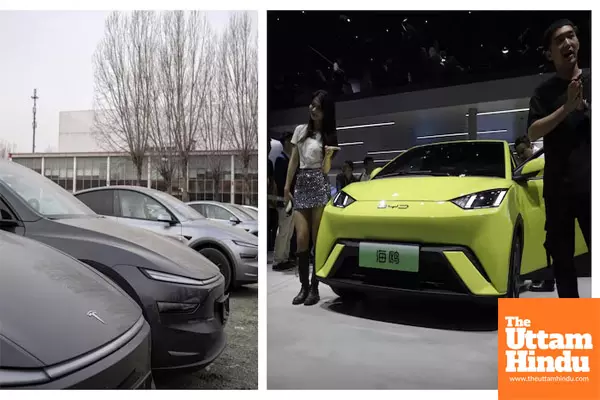
Elon Musk's Tesla Struggles in China as BYD's Rapid Growth Takes Over

New Delhi (The Uttam Hindu): Tesla's dominance in China, the world’s largest electric vehicle (EV) market, appears to be waning as the company grapples with declining sales and rising competition from local automaker BYD Co.
For the past five months, Tesla's shipments have been on the decline in China, with a staggering 49% drop in February compared to the previous year. The company shipped only 30,688 vehicles, marking the lowest monthly sales since July 2022. While Tesla's Shanghai factory is undergoing retooling and ramping up production, the overall trend in the Chinese market has not been favorable, with Tesla's market share slipping below 5%. This puts the American automaker in 11th place among the top 12 carmakers in China, according to recent data from the country’s Passenger Car Association.
In contrast, BYD, a Shenzhen-based company, has been flourishing. The company, which stopped producing combustion-engine vehicles in 2022, now controls a market share approaching 15%. In February alone, BYD sold over 318,000 fully electric and hybrid vehicles, marking a 161% year-on-year increase. The company's successful international expansion, with over 67,000 units sold abroad, further strengthens its position in the global market.
Tesla’s struggles in China can largely be attributed to its aging vehicle lineup, which lags behind BYD's more up-to-date and competitive offerings. The prices of Tesla’s Model Y and Model 3 vehicles have only been marginally reduced, with the average cost of a Model Y remaining around $33,500. Meanwhile, BYD’s popular models, such as the Song Plus, are priced significantly lower, starting at $21,000. The Seagull, another of BYD’s top models, is even more affordable at just $9,900.
Moreover, BYD has made significant strides in localizing its software to cater to domestic driving conditions. Its God’s Eye technology, which includes advanced driver-assistance features like lane-keeping and adaptive cruise control, is now available in some of its more affordable models. This is a critical factor in China, where consumers prioritize intelligent software features in their cars.
Tesla is not standing still and has introduced several updates, including a refreshed Model Y and new driver-assistance capabilities. However, these features come at a premium, with Full Self-Driving (FSD) capabilities costing $8,800, which is nearly the price of a BYD car. To remain competitive, Tesla may need to rethink its pricing strategies, offering more affordable or subscription-based FSD packages that appeal to a broader range of Chinese consumers.
Tesla could also look to integrate more locally sourced components and take advantage of China's advanced supply chain to stay competitive. However, BYD’s deep understanding of the domestic market and its ability to tailor its products accordingly has given it a significant edge in the Chinese EV race.
While Tesla still enjoys a strong global presence, its future in China will depend on its ability to recalibrate its pricing, increase local production, and adapt to consumer preferences. For now, BYD’s rapid growth and ability to deliver affordable, tech-rich EVs have positioned it as a formidable challenger in the world’s largest EV market.

